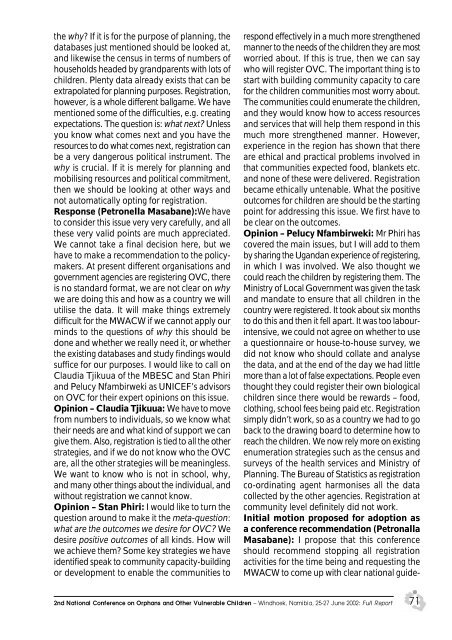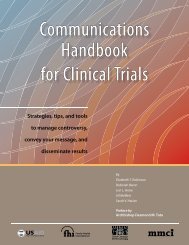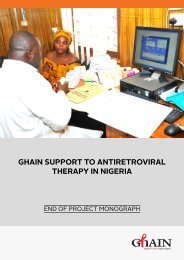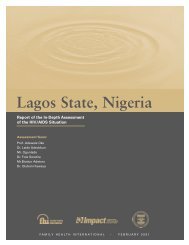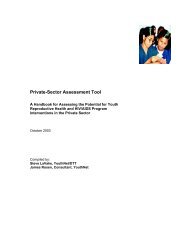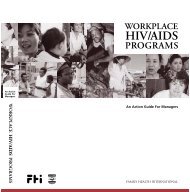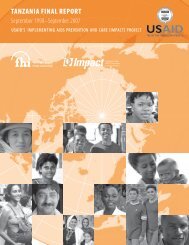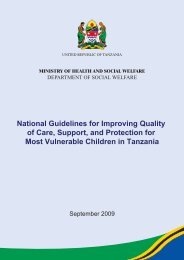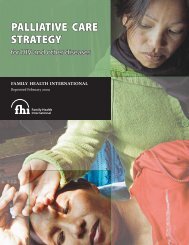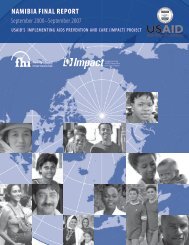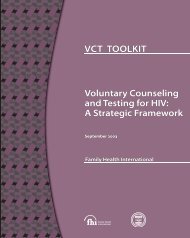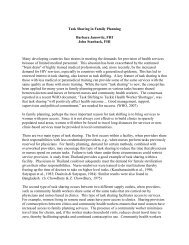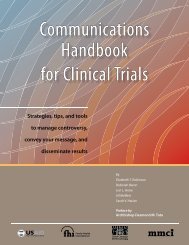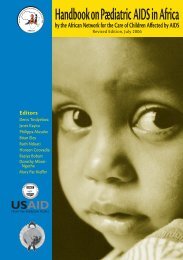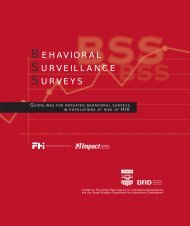2nd National Conference on Orphans and Other ... - FHI 360
2nd National Conference on Orphans and Other ... - FHI 360
2nd National Conference on Orphans and Other ... - FHI 360
Create successful ePaper yourself
Turn your PDF publications into a flip-book with our unique Google optimized e-Paper software.
the why? If it is for the purpose of planning, the<br />
databases just menti<strong>on</strong>ed should be looked at,<br />
<strong>and</strong> likewise the census in terms of numbers of<br />
households headed by gr<strong>and</strong>parents with lots of<br />
children. Plenty data already exists that can be<br />
extrapolated for planning purposes. Registrati<strong>on</strong>,<br />
however, is a whole different ballgame. We have<br />
menti<strong>on</strong>ed some of the difficulties, e.g. creating<br />
expectati<strong>on</strong>s. The questi<strong>on</strong> is: what next? Unless<br />
you know what comes next <strong>and</strong> you have the<br />
resources to do what comes next, registrati<strong>on</strong> can<br />
be a very dangerous political instrument. The<br />
why is crucial. If it is merely for planning <strong>and</strong><br />
mobilising resources <strong>and</strong> political commitment,<br />
then we should be looking at other ways <strong>and</strong><br />
not automatically opting for registrati<strong>on</strong>.<br />
Resp<strong>on</strong>se (Petr<strong>on</strong>ella Masabane):We have<br />
to c<strong>on</strong>sider this issue very very carefully, <strong>and</strong> all<br />
these very valid points are much appreciated.<br />
We cannot take a final decisi<strong>on</strong> here, but we<br />
have to make a recommendati<strong>on</strong> to the policymakers.<br />
At present different organisati<strong>on</strong>s <strong>and</strong><br />
government agencies are registering OVC, there<br />
is no st<strong>and</strong>ard format, we are not clear <strong>on</strong> why<br />
we are doing this <strong>and</strong> how as a country we will<br />
utilise the data. It will make things extremely<br />
difficult for the MWACW if we cannot apply our<br />
minds to the questi<strong>on</strong>s of why this should be<br />
d<strong>on</strong>e <strong>and</strong> whether we really need it, or whether<br />
the existing databases <strong>and</strong> study findings would<br />
suffice for our purposes. I would like to call <strong>on</strong><br />
Claudia Tjikuua of the MBESC <strong>and</strong> Stan Phiri<br />
<strong>and</strong> Pelucy Nfambirweki as UNICEF’s advisors<br />
<strong>on</strong> OVC for their expert opini<strong>on</strong>s <strong>on</strong> this issue.<br />
Opini<strong>on</strong> – Claudia Tjikuua: We have to move<br />
from numbers to individuals, so we know what<br />
their needs are <strong>and</strong> what kind of support we can<br />
give them. Also, registrati<strong>on</strong> is tied to all the other<br />
strategies, <strong>and</strong> if we do not know who the OVC<br />
are, all the other strategies will be meaningless.<br />
We want to know who is not in school, why,<br />
<strong>and</strong> many other things about the individual, <strong>and</strong><br />
without registrati<strong>on</strong> we cannot know.<br />
Opini<strong>on</strong> – Stan Phiri: I would like to turn the<br />
questi<strong>on</strong> around to make it the meta-questi<strong>on</strong>:<br />
what are the outcomes we desire for OVC? We<br />
desire positive outcomes of all kinds. How will<br />
we achieve them? Some key strategies we have<br />
identified speak to community capacity-building<br />
or development to enable the communities to<br />
resp<strong>on</strong>d effectively in a much more strengthened<br />
manner to the needs of the children they are most<br />
worried about. If this is true, then we can say<br />
who will register OVC. The important thing is to<br />
start with building community capacity to care<br />
for the children communities most worry about.<br />
The communities could enumerate the children,<br />
<strong>and</strong> they would know how to access resources<br />
<strong>and</strong> services that will help them resp<strong>on</strong>d in this<br />
much more strengthened manner. However,<br />
experience in the regi<strong>on</strong> has shown that there<br />
are ethical <strong>and</strong> practical problems involved in<br />
that communities expected food, blankets etc.<br />
<strong>and</strong> n<strong>on</strong>e of these were delivered. Registrati<strong>on</strong><br />
became ethically untenable. What the positive<br />
outcomes for children are should be the starting<br />
point for addressing this issue. We first have to<br />
be clear <strong>on</strong> the outcomes.<br />
Opini<strong>on</strong> – Pelucy Nfambirweki: Mr Phiri has<br />
covered the main issues, but I will add to them<br />
by sharing the Ug<strong>and</strong>an experience of registering,<br />
in which I was involved. We also thought we<br />
could reach the children by registering them. The<br />
Ministry of Local Government was given the task<br />
<strong>and</strong> m<strong>and</strong>ate to ensure that all children in the<br />
country were registered. It took about six m<strong>on</strong>ths<br />
to do this <strong>and</strong> then it fell apart. It was too labourintensive,<br />
we could not agree <strong>on</strong> whether to use<br />
a questi<strong>on</strong>naire or house-to-house survey, we<br />
did not know who should collate <strong>and</strong> analyse<br />
the data, <strong>and</strong> at the end of the day we had little<br />
more than a lot of false expectati<strong>on</strong>s. People even<br />
thought they could register their own biological<br />
children since there would be rewards – food,<br />
clothing, school fees being paid etc. Registrati<strong>on</strong><br />
simply didn’t work, so as a country we had to go<br />
back to the drawing board to determine how to<br />
reach the children. We now rely more <strong>on</strong> existing<br />
enumerati<strong>on</strong> strategies such as the census <strong>and</strong><br />
surveys of the health services <strong>and</strong> Ministry of<br />
Planning. The Bureau of Statistics as registrati<strong>on</strong><br />
co-ordinating agent harm<strong>on</strong>ises all the data<br />
collected by the other agencies. Registrati<strong>on</strong> at<br />
community level definitely did not work.<br />
Initial moti<strong>on</strong> proposed for adopti<strong>on</strong> as<br />
a c<strong>on</strong>ference recommendati<strong>on</strong> (Petr<strong>on</strong>alla<br />
Masabane): I propose that this c<strong>on</strong>ference<br />
should recommend stopping all registrati<strong>on</strong><br />
activities for the time being <strong>and</strong> requesting the<br />
MWACW to come up with clear nati<strong>on</strong>al guide-<br />
<str<strong>on</strong>g>2nd</str<strong>on</strong>g> <str<strong>on</strong>g>Nati<strong>on</strong>al</str<strong>on</strong>g> <str<strong>on</strong>g>C<strong>on</strong>ference</str<strong>on</strong>g> <strong>on</strong> <strong>Orphans</strong> <strong>and</strong> <strong>Other</strong> Vulnerable Children – Windhoek, Namibia, 25-27 June 2002: Full Report<br />
71


